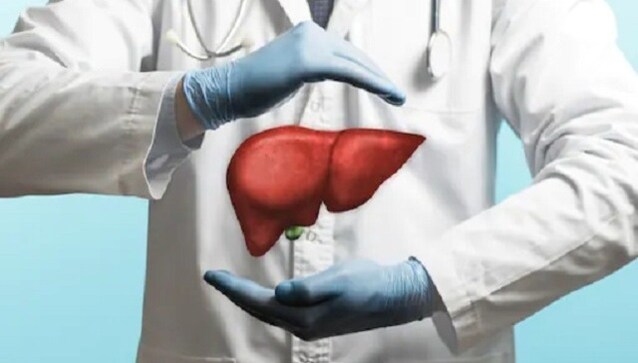Chronic liver disease is mainly a lifestyle-related disease, with a sedentary lifestyle being a predisposing factor

Representative image. News18
Non-alcoholic fatty liver disease has become one of the leading causes of chronic liver disease. It is mainly a disease related to lifestyle, with a sedentary lifestyle being a predisposing factor. There are other causes like alcohol consumption, hepatitis C, metabolic liver diseases that can also cause fatty liver and should be ruled out.
Metabolic syndrome, ie patients with obesity, ie BMI > 30, diabetes mellitus, dyslipidemia, hypothyroidism, are prone to developing fatty liver and should be screened. It is no longer considered a benign condition and can lead to chronic liver disease and liver cirrhosis. Non-alcoholic steatohepatitis (NASH) is an intermediate stage in which fat in the liver can cause liver damage.
As with other lifestyle diseases, prevention is the cure here.
Weight
It is the treatment of choice for fatty liver disease. Gradual weight loss of 7 to 10 percent of body weight over a year is recommended. Rapid weight loss can make fatty liver worse.
Reduce the number of calories consumed. Using a health rack can help you with this.
A diet rich in fruits and vegetables, whole grains is beneficial. Decrease carbohydrate intake from rice and starchy foods. Limit your intake of saturated fats, found in meat, dairy products. Replace them with monounsaturated fats (olive, canola, and peanut oils) and polyunsaturated fats (corn, safflower, soybean, and many types of nut oils). Omega-3 fatty acids, a type of polyunsaturated fat found in oily fish like salmon, flaxseed oil, and walnuts, are beneficial. Foods with a high glycemic index should be avoided.
Reduce the amount of salt and sugar in your diet. Avoid sugary drinks like juice, tea.
Caffeinated coffee reduces the risk of liver fibrosis in several liver diseases, including NAFLD. Studies suggest that you need to drink more than two cups a day to get this benefit, however some people do not tolerate it well.
Foods that contain vitamin E like almonds, peanuts, pumpkin and avocado reduce liver damage.
Exercise for at least 30 minutes five days a week. Choose moderate-intensity exercise (jogging, bicycling, swimming).
If diet and exercise don’t help, you can join a doctor-supervised weight-loss program that uses medication. There are surgical and endoscopic weight loss therapies that work by either limiting the amount of food your stomach can hold or by reducing the amount of calories your body absorbs.
Control your diabetes, cholesterol
Along with a proper diet, medications may be needed. Regular monitoring of blood sugar and lipid levels is recommended.
protect your liver
Avoid drinking alcohol.
Take medications only as directed.
Be careful when taking dietary supplements. Certain vitamins and minerals, such as vitamin A, iron, and niacin, can be harmful to the liver in higher doses than necessary or prescribed.
Check with your health care provider before trying any herbal remedies.
A multidisciplinary approach to treatment involving hepatologists, nutritionists, endocrinologists, and other specialists is essential to successfully manage the underlying metabolic conditions associated with fatty liver disease.
The author is Consultant – Hepatology and Liver Transplantation at Global Hospital, Mumbai. Views are personal.
read all Last News, trending news, cricket news, bollywood news,
Indian news Y show news here. Follow us on Facebook, Twitter and Instagram.
Source: www.firstpost.com